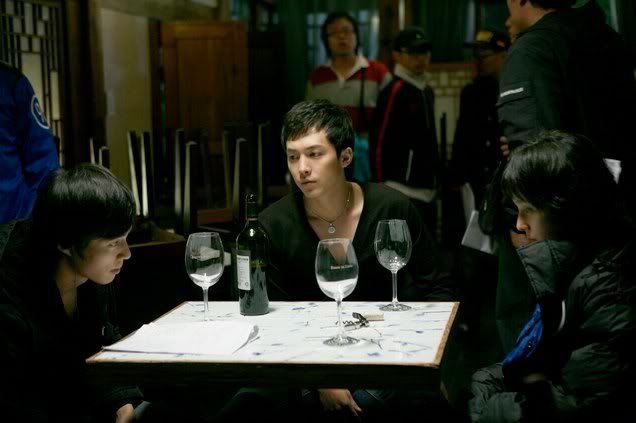Saturday, November 06, 2010
 3:33 PM |
Girl, Just Move On
3:33 PM |
Girl, Just Move On

Aaron Kim's
Hello, My Love [2009] is a cruel film, a hysterical embarrassment of the kind that comes from a panicked consideration of homosexuality. Which may be understandable, considering this is a Korean film. In that context then, one may be able to understand this film as a product of a culture still in the beginning stages of dealing with an issue which it is traditionally silent about. This does not exactly mean homosexuality is non-existent in Korean culture; it is just a taboo topic nobody talks about in the open, much less depict it in something as explicit as film. I think of two other Korean films dealing with the issue, and you can see a culture's almost pained struggle with it. Yu Ha's
Frozen Flower [2008], a historical romp about a Korean monarch in love with his bodyguard, treats homosexuality almost as an afterthought, and the filmmakers in fact pepper the story with generous amounts of heterosexual love scenes that the choices almost become curious. Leesong Hee-il’s
No Regrets [2006], the troubled love story between a hustler and his rich lover, is tender in many places, but feels the need to bracket their relationship with surprising violence, one that involves burying somebody alive. Kim's film is cut from the same sensibility. It tells the story of a sweet-natured woman, a deejay who gives saccharine love advise over the radio, who is jilted by her boyfriend of ten years who leaves her for another man. Her discovery of his secret life leads her to hysterics of the broken china kind, and finally leads her to demand that her ex-boyfriend give her a second chance to claim him back: date her for a month, see how it goes, and if he doesn't agree, she is going to tell his mother. This also leads her to seduce her ex-boyfriend's current boyfriend, believing that she can change his sexual preference with the premise that he has "not met the right girl."
I rolled my eyes.
And yet, if I have to be absolutely honest about the strange overtures of human nature, her actions are perfectly understandable. Because if I were a straight woman -- and the film is told from the point of view of a heartbroken heterosexual woman -- I would probably believe this bullshit, and do the exact same bullshitty things. Still, what it does goes beyond an acknowledgment of that impulse, and goes straight to fantasia somewhere midway in the film. This is its flaw. (Trust me, no gay man will ever succumb to female wiles
just like that, not even after several bottles of red wine.) As a gay man, I have never been insulted this way by a movie since Danny Zialcita's ill-advised
Si Malakas, Si Maganda, Si Mahinhin [1980], where a lesbian and a gay man suddenly become a straight couple after a drunken episode of sex. Oh, please. And then there is its muddled effort towards some kind of resolution, involving mistaken assumptions, a jilted boss, a jilted Frenchman/former lover, a party that turns chaotic, a surprise coming out on air, and an exorcism of sorts. Nothing works. This film has no heart.
At least Joel Lamangan and Eric Quizon's
Pusong Mamon [1998] was more honest in its depiction of a male-male-female threesome storyline. See? I'm so upset I actually have a nice word to say about a Joel Lamangan film.
Labels: film, queer
[0] This is Where You Bite the Sandwich
GO TO OLDER POSTS
GO TO NEWER POSTS

















 3:33 PM |
Girl, Just Move On
3:33 PM |
Girl, Just Move On
